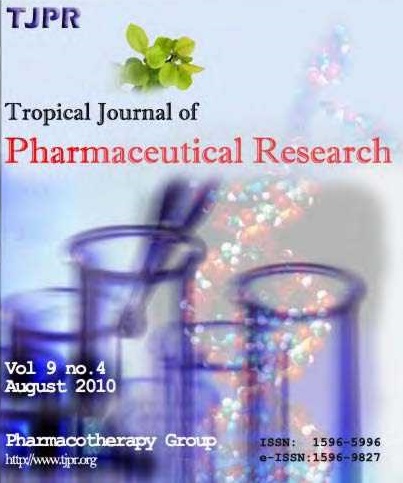银杏叶片联合复方卡比多巴治疗帕金森病的疗效观察
IF 0.6
4区 医学
Q4 PHARMACOLOGY & PHARMACY
引用次数: 1
摘要
目的:探讨银杏叶片联合复方卡比多巴片对帕金森病(PD)患者认知功能、血清同型半胱氨酸(Hcy)、丙二醛(MDA)和神经元特异性烯醇化酶(NSE)水平的影响。方法:选取2020年12月至2022年12月在中国徐州医科大学附属医院住院的80例PD患者,随机分为西药组(n = 40,单用复方卡比多巴片)和联用组(n = 40,银杏叶片联合复方卡比多巴片),口服治疗3个月。治疗前后分别采用简易精神状态检查(MMSE)和蒙特利尔认知评估(MoCA)评估认知功能。采用高效液相色谱法测定血清Hcy水平,酶联免疫吸附试验(ELISA)测定血清MDA和NSE水平。同时记录治疗过程中的不良反应。结果:联合组治疗后总有效率显著高于西药组(95.00% vs 80.00 %, p <0.05)。治疗后,联合组患者MMSE、MoCA评分均显著高于对照组(p <联合用药组血清Hcy、MDA、NSE水平显著低于西药组(p <0.05)。治疗期间,两组患者不良反应发生率比较,差异无统计学意义(p >0.05)。结论:银杏叶片联合卡比多巴与单用卡比多巴相比,可显著改善PD患者认知功能,且安全性高。然而,建议进一步的临床试验来验证这些发现。本文章由计算机程序翻译,如有差异,请以英文原文为准。
Effect of ginkgo leaf tablets combined with compound carbidopa on patients with Parkinson’s disease
Purpose: To determine the effect of a combination of ginkgo leaf tablets with compound carbidopa tablets on cognitive function, serum homocysteine (Hcy), malondialdehyde (MDA) and neuron-specific enolase (NSE) levels in patients with Parkinson's disease (PD).Methods: A total of eighty (80) PD patients admitted to The Affiliated Hospital of Xuzhou Medical University, Xuzhou, China between December 2020 and December 2022 were randomly divided into two groups: Western medicine group (n = 40, using compound carbidopa tablets alone) and combination group (n = 40, using ginkgo leaf tablets combined with compound carbidopa tablets), and orally treated for 3 months. Mini-mental state examination (MMSE) and Montreal Cognitive Assessment (MoCA) were used to assess cognitive function before and after treatment. High-performance liquid chromatography was used to determine serum Hcy levels, while enzyme-linked immunosorbent assay (ELISA) was used to evaluate serum MDA and NSE levels. Adverse reactions were also recorded during treatment.Results: Total response rate following treatment in combination group was significantly higher than in Western medicine group (95.00 vs 80.00 %, p < 0.05). After treatment, MMSE and MoCA scores in combination group were significantly higher (p < 0.05) than those in Western medicine group, while serum Hcy, MDA and NSE levels in combination group were significantly lower than those in Western medicine group (p < 0.05). During treatment, there was no significant difference in incidence of adverse reactions between the two groups (p > 0.05).Conclusion: Ginkgo leaf tablets in combination with carbidopa significantly improve cognitive functions associated with PD with high safety, when compared to carbidopa tablets alone. However, further clinical trials are commended to validate these findings.
求助全文
通过发布文献求助,成功后即可免费获取论文全文。
去求助
来源期刊
CiteScore
1.00
自引率
33.30%
发文量
490
审稿时长
4-8 weeks
期刊介绍:
We seek to encourage pharmaceutical and allied research of tropical and international relevance and to foster multidisciplinary research and collaboration among scientists, the pharmaceutical industry and the healthcare professionals.
We publish articles in pharmaceutical sciences and related disciplines (including biotechnology, cell and molecular biology, drug utilization including adverse drug events, medical and other life sciences, and related engineering fields). Although primarily devoted to original research papers, we welcome reviews on current topics of special interest and relevance.

 求助内容:
求助内容: 应助结果提醒方式:
应助结果提醒方式:


